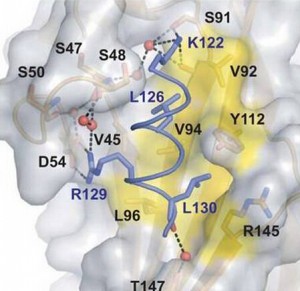Among massive peptide products, peptide synthesis has attracted increasing attention in recent days for its unique functions. Generally, it is a kind of intracellular protein synthesis during the formation of the polypeptide. It uses artificial methods of various amino acids in accordance with the order of pre-designed connection into polypeptides.
 Specifically, the most commonly used for this unique synthesis process is solid phase synthesis; the amino acid linked to the synthesis of the peptide chain on the resin can be automated operated. As is known, peptide synthesis has already developed to a series of areas, such as polypeptide synthesis, small peptide synthesis, nonribosomal peptide synthesis, cyclic peptide synthesis, and so on. Based on its wide use in related research fields, peptide synthesis is potential to make your study much easier, because it can provide a large number of practical functions in peptide synthesis for your study, enabling high-quality purification, synthesis, and production steps.
Specifically, the most commonly used for this unique synthesis process is solid phase synthesis; the amino acid linked to the synthesis of the peptide chain on the resin can be automated operated. As is known, peptide synthesis has already developed to a series of areas, such as polypeptide synthesis, small peptide synthesis, nonribosomal peptide synthesis, cyclic peptide synthesis, and so on. Based on its wide use in related research fields, peptide synthesis is potential to make your study much easier, because it can provide a large number of practical functions in peptide synthesis for your study, enabling high-quality purification, synthesis, and production steps.
In addition, a variety of proprietary technologies, peptide manufacturing facilities, and expertise are applied to provide large-volume, high-quality and complex custom peptides from research grade to GMP production, giving you the flexibility you need for custom peptides. Certainly, peptide synthesis has other characteristics as well. Actually, the combination of solid phase and liquid phase synthesis can be realized with the support of microwave and ligation technologies, as well as the particular FlexpeptideTM technology platform. While as for its features, they mainly include different purity levels, optimized Fmoc and Boc methodologies, bulk scale contract synthesis, stable isotope labeling, etc.. During the synthesis process, each step or additional procedure for every peptide should be payed enough attention, because only in this way can the peptide synthesis really improve researchers’ studies.
To be general, peptide synthesis is the production of peptides, which means the synthesis is a complex process that requires enough concerns. Current biotechnology is developing in a rapid trend so that peptide synthesis is going to benefit from the magic power of modern technology, discovering more available peptide products to meet increasing daily needs.